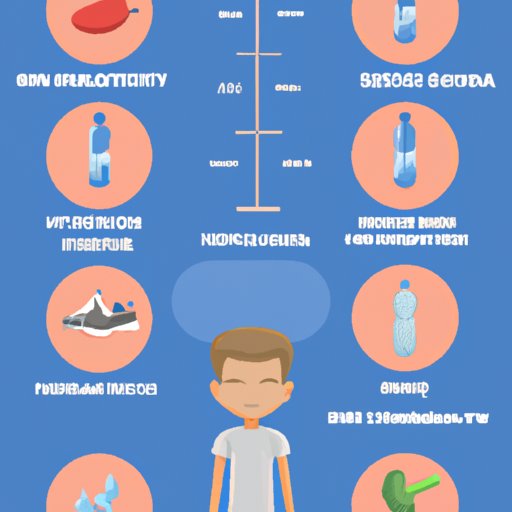Introduction
Staying healthy is an important goal for everyone. But what exactly does it mean to be “healthy”? Generally speaking, being healthy means taking care of your body by eating right, exercising regularly, and managing stress levels. In this article, we’ll explore each of these topics in depth and provide tips for achieving optimal health.
Eating a Balanced Diet
Eating a balanced diet is one of the most important aspects of maintaining good health. A balanced diet includes a variety of foods from all food groups, including fruits and vegetables, whole grains, lean proteins, and healthy fats. Eating a wide range of nutrient-dense foods provides your body with the vitamins, minerals, and other nutrients it needs to function properly.
In addition to providing essential nutrients, eating a healthy diet has many other benefits. It can help boost energy levels, reduce the risk of chronic diseases, improve mood, and promote weight loss. For these reasons, it’s important to make sure that you’re eating a balanced diet.
Exercise Regularly
Exercise is another important component of staying healthy. Regular physical activity helps keep your heart and lungs in top shape, strengthens your muscles, and boosts your overall energy levels. It can also help reduce stress levels, improve your mood, and aid in weight loss.
Creating an effective exercise plan is key to achieving your fitness goals. Start by setting realistic goals and breaking them down into smaller, more manageable tasks. Then, find activities that you enjoy and make time for them in your schedule. Finally, track your progress and reward yourself when you reach milestones. With a little bit of effort, you can create an exercise routine that works for you.
Get Enough Sleep
Sleep is another important factor in maintaining good health. Most adults need 7-8 hours of sleep each night in order to feel their best. Getting adequate rest helps keep your immune system strong, improves brain function, and reduces the risk of certain diseases. There are also mental health benefits associated with getting enough sleep, such as improved mood and better concentration.
Good sleep hygiene is essential for getting quality rest. To ensure that you’re getting enough sleep, try to maintain a consistent sleep schedule, limit caffeine and alcohol intake, and avoid screens before bedtime. Additionally, creating a relaxing nighttime routine can help you wind down at the end of the day and get ready for bed.
Manage Stress Levels
Stress is a normal part of life, but when left unchecked, it can have serious consequences on your physical and mental health. Long-term stress can lead to chronic fatigue, depression, and a weakened immune system. Therefore, it’s important to take steps to manage your stress levels.
There are various techniques you can use to reduce stress. Exercise is a great way to release tension, as well as deep breathing exercises and yoga. Taking time out for yourself is also important, whether it’s reading a book, going for a walk, or listening to music. Experiment with different methods to find the ones that work best for you.
Stay Hydrated
Staying hydrated is another important element of good health. Water helps keep your body functioning properly by flushing out toxins, carrying nutrients to cells, and regulating body temperature. Drinking plenty of water also helps to boost energy levels, improve digestion, and support healthy skin.
If you’re having trouble drinking enough water, there are several strategies you can try. Invest in a reusable water bottle and carry it with you throughout the day. Set reminders on your phone to drink water at regular intervals. And if plain water isn’t appealing, add some flavor with lemon or cucumber slices or opt for unsweetened tea or sparkling water.
Conclusion
By following these tips, you can take steps to achieve optimal health. Eating a balanced diet provides your body with essential nutrients, exercising regularly keeps your heart and lungs healthy, getting enough sleep helps your body recharge, managing stress levels reduces long-term health risks, and staying hydrated supports overall wellbeing. With a few simple changes, you can be on your way to a healthier lifestyle.
(Note: Is this article not meeting your expectations? Do you have knowledge or insights to share? Unlock new opportunities and expand your reach by joining our authors team. Click Registration to join us and share your expertise with our readers.)
